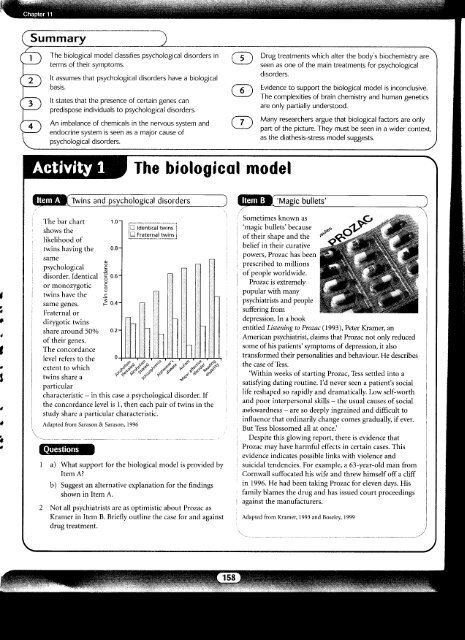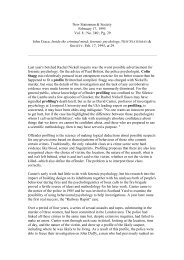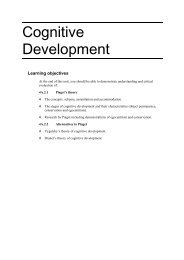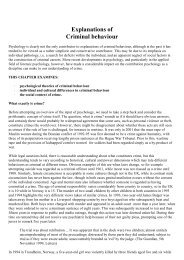Ch 11 - Jeff Standen
Ch 11 - Jeff Standen
Ch 11 - Jeff Standen
You also want an ePaper? Increase the reach of your titles
YUMPU automatically turns print PDFs into web optimized ePapers that Google loves.
<strong>Ch</strong>apter <strong>11</strong><br />
( Summary" 1<br />
The biological model classifies psychological disorders in<br />
terms of their symptoms.<br />
It assumes that psychological disorders have a biological<br />
basis.<br />
It states that the presence of certain genes can<br />
predispose individuals to psychological disorders.<br />
An imbalance of chemicals in the nervous system and<br />
endocrine system is seen as a major cause of<br />
psychological disorders.<br />
v.<br />
CD<br />
CD<br />
Drug treatments which alter the body's biochemistry are<br />
seen as one of the main treatments for psychological<br />
disorders.<br />
Evidence to support the biological model is inconclusive.<br />
The complexities of brain chemistry and human genetics<br />
are only partially understood.<br />
Many researchers argue that biological factors are only<br />
part of the picture. They must be seen in a wider context,<br />
as the diathesis-stress model suggests.<br />
Activity 1<br />
The biological model<br />
f^SSEK Twins and psychological disorders ) 'Magic bullets'<br />
The bar chart<br />
shows the<br />
likelihood of<br />
twins having the<br />
same<br />
psychological<br />
disorder. Identical<br />
or monozygotic<br />
twins have the<br />
same genes.<br />
Fraternal or<br />
dizygotic twins<br />
share around 50%<br />
of their genes.<br />
The concordance<br />
level refers to the<br />
extent to which<br />
twins share a<br />
particular<br />
1.0-1<br />
0.8-<br />
0.6-<br />
0.4-<br />
0.2-<br />
U Identical twins j<br />
• Fraternal twins j<br />
characteristic - in this case a psychological disorder. If<br />
the concordance level is 1, then each pair of twins in the<br />
study share a particular characteristic.<br />
Adapted from Sarason & Sarason, 1996<br />
Questions<br />
1 a) What support for the biological model is provided by<br />
Item A?<br />
b) Suggest an alternative explanation for the findings<br />
shown in Item A.<br />
2 Not all psychiatrists are as optimistic about Prozac as<br />
Kramer in Item B. Briefly outline the case for and against<br />
drug treatment.<br />
Sometimes known as<br />
'magic bullets' because<br />
of their shape and the<br />
belief in their curative<br />
powers, Prozac has been<br />
prescribed to millions<br />
of people worldwide.<br />
Prozac is extremely<br />
popular with many<br />
psychiatrists and people<br />
suffering from<br />
depression. In a book<br />
entitled Listening to Prozac (1993), Peter Kramer, an<br />
American psychiatrist, claims that Prozac not only reduced<br />
some of his patients' symptoms of depression, it also<br />
transformed their personalities and behaviour. He describes<br />
the case of Tess.<br />
'Within weeks of starting Prozac, Tess settled into a<br />
satisfying dating routine. I'd never seen a patient's social<br />
life reshaped so rapidly and dramatically. Low self-worth<br />
and poor interpersonal skills - the usual causes of social<br />
awkwardness - are so deeply ingrained and difficult to<br />
influence that ordinarily change comes gradually, if ever.<br />
But Tess blossomed all at once.'<br />
Despite this glowing report, there is evidence that<br />
Prozac may have harmful effects in certain cases. This<br />
evidence indicates possible links with violence and<br />
suicidal tendencies. For example, a 63-year-old man from<br />
Cornwall suffocated his wife and threw himself off a cliff<br />
in 1996. He had been taking Prozac for eleven days. His<br />
family blames the drug and has issued court proceedings<br />
against the manufacturers.<br />
Adapted from Kramer, 1993 and Boseley, 1999







